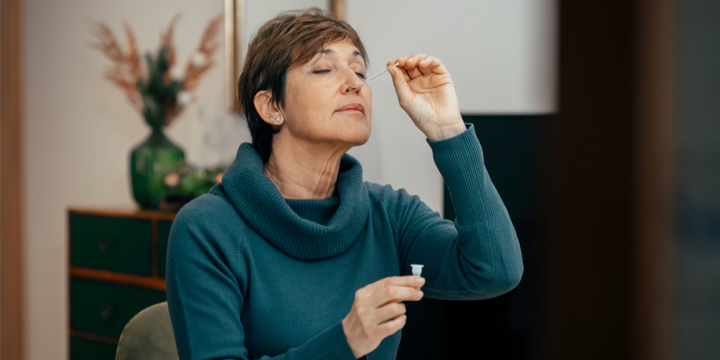Testing yourself against Covid is now possible: a decree from the Minister of Health authorizes the sale in pharmacies of self-testing Covid nasal swabs, for asymptomatic people over 15 years of age.
These self-tests “will gradually be deployed in thousands of pharmacies throughout the week,” said the Minister of Health, Olivier Véran, in an interview with the Journal du dimanche.
The government advises repeated use of these tests to maximize the chances of detecting the virus when you are most contagious.
Read also: Self-tests: will they be available in pharmacies from April 12?
Less invasive tests
The self-tests should allow individuals to test themselves before a family reunion, for example, without renouncing the barrier gestures specifies the government. But they may also be the subject of repeated screening campaigns, launched either by an ARS or by an educational establishment.
They “will be quickly made available in schools,” said the Minister of Health, saying consider “going up to two tests per week per student and per teacher.”
These self-tests do not require the presence of health professionals and their sampling method is “less invasive” than RT-PCR devices. They “will allow more frequent tests to be carried out”, underlines the order published in the Official Journal.
Who distributes them?
Seven kits are currently approved in France. Four are produced by Chinese groups, two by the same Swiss company, Biosynex, and one by a French company, AAZ.
In Germany, supermarkets were robbed in the first weekend of authorization, sparking some political criticism.
To avoid this, in France, “wholesale distributors should have a sufficient number of self-tests as of Monday April 12 for dispensing pharmacists to start delivering them to patients,” assured a federation of pharmacists in a statement. the FSPF.
6 euros maximum
Their price will be limited: it cannot exceed 6 euros until May 15, then beyond 5.20 euros. For caregivers of fragile people, such as home help services and family carers, self-tests will be paid for, within the limit of 10 self-tests per month. Internet sales are prohibited.
The self-tests will be delivered free of charge, upon proof, to home-based employees working with elderly or disabled people, as well as to family carers accompanying these people.
A less reliable result
The High Authority for Health (HAS) has given the green light to the deployment of these self-tests, but in its opinion published on March 16, it specifies that any positive self-test must then be confirmed by an RT-PCR test.
“We can test ourselves at home and, in the event of a positive result, it will be necessary to confirm it by PCR. Not only to check if there is a variant, but also to keep a monitoring tool”, confirms Olivier Véran in the columns of the JDD.
 Cherry tomatoes contaminated with salmonella: 92 sick and 1 dead
Cherry tomatoes contaminated with salmonella: 92 sick and 1 dead  A better coaching method can make a person grow
A better coaching method can make a person grow  What is the method to prevent diabetes in children?
What is the method to prevent diabetes in children?  What are the effective factors in causing stomach ulcers?
What are the effective factors in causing stomach ulcers?  Why do embarrassing memories seem to appear at night?
Why do embarrassing memories seem to appear at night?  The amazing link between SARS-CoV-2 infection and newly started diabetes
The amazing link between SARS-CoV-2 infection and newly started diabetes  WHO says monkey pox is not a global emergency right now
WHO says monkey pox is not a global emergency right now  Single cell RNA sequencing uncovers new mechanisms of heart disease
Single cell RNA sequencing uncovers new mechanisms of heart disease  Hepatitis of unknown origin: 3 new deaths and 228 cases worldwide
Hepatitis of unknown origin: 3 new deaths and 228 cases worldwide 